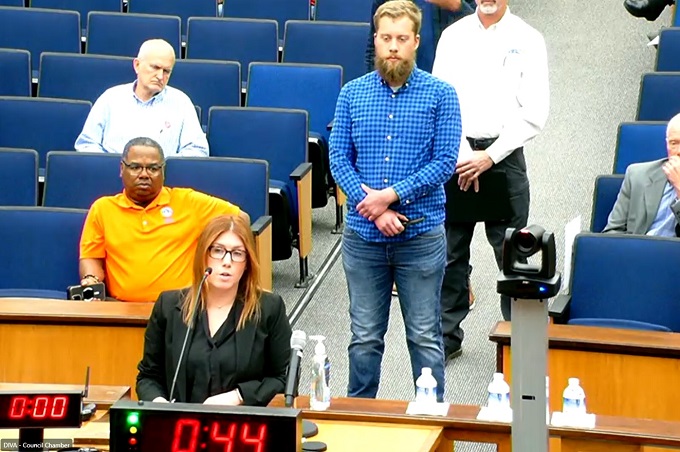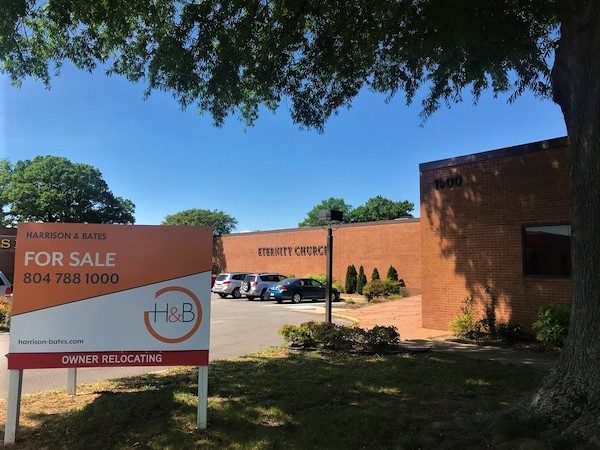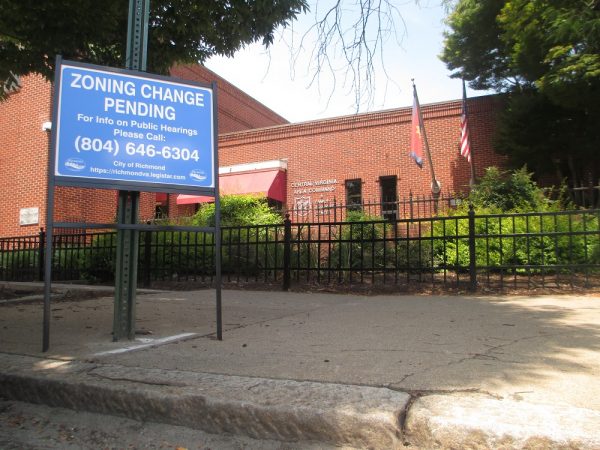
Opponents lined up to speak in Thursday’s public hearing on a plan to increase shelter bed capacity at the area’s Salvation Army headquarters on Chamberlayne Avenue. (Screenshot)
A proposal by the city to add more emergency shelter beds at the Salvation Army’s headquarters on Chamberlayne Avenue is being met with pushback from business owners in Richmond’s Northside and a threat of legal action.
Opponents of the proposal, which is part of a larger plan to enhance services for the homeless in the city and increase year-round shelter capacity, include members of the Chamberlayne Industrial Center Association and other residents and business owners.
They say that they’re not against providing shelter for those in need, but that they were not properly notified of the plan by the city and only learned of it from a report in Richmond BizSense last month.
In a public hearing Thursday before City Council’s Education and Human Services Standing Committee, Dave Kohler, president of the Chamberlayne association, said it would take legal action if council approves the proposal this Monday, one week after the plan was formally introduced by council.
“If it goes through, there will be an injunction filed, just FYI,” Kohler told councilmembers. The association has retained Kutak Rock attorney Jeremy Williams, according to a letter it sent to councilmembers last week.
Committee chairwoman Stephanie Lynch and fellow councilmembers Andreas Addison and Ann-Frances Lambert, whose district includes the Salvation Army site at 1900 Chamberlayne Ave., maintained that the city has been struggling to secure a permanent year-round shelter location for years and that this plan has been in discussions since the spring and presented to the committee in September and October.

The Salvation Army bought the former Eternity Church property at 1900 Chamberlayne Ave. for its regional headquarters in 2019. (BizSense file photo)
They stressed that the Salvation Army proposal is one part of a larger plan that ultimately would put a shelter in each of the city’s nine magisterial districts. They also emphasized the need to open an inclement weather shelter at the site, which served as the city’s cold weather shelter last year under a different operator, before lower temperatures arrive in December.
“We’re not trying to force this down, but time is of the essence,” Lambert said.
The city is aiming to open an inclement weather shelter at the site by Dec. 1, with 100 beds for homeless families and adults to be added to the roughly 50 beds that the Salvation Army already provides there. Half of those beds would become year-round beds for individuals by next May.
Other parts of the larger plan include using the former HI Richmond Hostel building at 7 N. Second St. downtown as additional shelter capacity, and potentially a site at 10 E. Belt Blvd. in Southside that, collectively, would increase the total number of available year-round shelter beds in the city from 209 to 321 – a 54 percent increase within the regional Greater Richmond Continuum of Care services network.
The Salvation Army part of the plan would occur first, allowing for the inclement weather shelter and laying the groundwork for a long-term shelter location. Council’s vote at its meeting this Monday would approve a grant contract with the Salvation Army that would contribute $7 million in city funds toward the nonprofit’s $15 million rehab to turn the building into its planned Center of Hope.

Salvation Army is planning a $15 million renovation to turn the building into a facility called Center of Hope. (Image courtesy Salvation Army)
The city also would lease part of the building from the Salvation Army for a housing resource center, which advocates have said is needed to provide a physical point of entry for those seeking services and case management in the Richmond region’s network. That point of entry had been the Commonwealth Catholic Charities building at 511 W. Grace St., which Daily Planet Health Services purchased in 2020.
Opponents who spoke at Thursday’s hearing asked for a more equitable arrangement across the city, citing crime and other incidents that they said stemmed from last year’s inclement weather shelter at the Salvation Army site. That shelter was operated by Commonwealth Catholic Charities; this year’s shelter would be run by the Salvation Army, councilmembers noted.
Previous years saw the inclement weather shelter at various locations around town, such as the Quality Inn Central hotel on Arthur Ashe Boulevard, now slated for redevelopment. Commonwealth Catholic Charities, which operates several facilities around town, had sought to open a cold weather shelter in Manchester at the former Community Bainbridge Baptist Church. Neighborhood opposition to that proposal prompted the organization to terminate a contract it had on the property.
Similar opposition limited the number of beds at the Salvation Army site when it moved its headquarters from downtown in 2020. The larger space was to accommodate about 50 more beds, bringing its total capacity to 100, but the number of beds has been kept to about 50 since then.

A zoning change sign outside the Salvation Army’s downtown building on Grace Street in 2019. (BizSense file photo)
“It’s unfair that all the shelter gets located in our backyard and no other district,” said Mike Salmon, president of Talley Sign Co. on Chamberlayne, in Thursday’s hearing.
Alex Lugovoy, owner of local real estate firm Dobrin Property Management, added that increasing shelter capacity at the site would be detrimental to the corridor’s development.
“That district is a neighborhood in bloom, and you guys are risking putting that neighborhood back 20 years,” Lugovoy said. “You’ve got something close to Scott’s Addition, and you guys are going to ruin it, unfortunately.”
In 2021, the city initiated changes to several zoning districts, including the M-1 manufacturing district that includes the Chamberlayne site, that added shelters as a permissible use in that district. The change means that the Salvation Army property can be used as a shelter by right, without the need for a special-use permit.
The city’s deal with the Salvation Army includes an option that, if the nonprofit doesn’t raise its portion of the $15 million project within three years, the city would be able to purchase the Chamberlayne property for $4.5 million at the end of its three-year lease for the housing resource center.
City Council is scheduled to hold its own public hearing before voting on the Salvation Army deal at its 6 p.m. meeting Monday.
The post Northside businesses wary of city’s plan to add shelter capacity on Chamberlayne Ave. appeared first on Richmond BizSense.